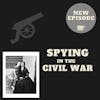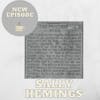Spying In the Civil War

Collecting intelligence against ones enemy has been a longstanding military practice. Commanders have long sought to ensure they have the most accurate information before heading to battle to maximize their effectiveness and the Civil War was no different.
Join me this week as I dive into the history of spying during the Civil War.
SOURCES
Brammer, Robert. “The Old Capitol Prison and the United States Supreme Court.” Library of Congress. (LINK)
“Elizabeth Van Lew: A Spy in Plain Sight.” Office of the Director of National Intelligence. (LINK)
“Elizabeth Van Lew.” National Park Service. (LINK)
Glantz, Edward. “Guide to Civil War Intelligence.” Journal of Intelligence Studies. Winter/Spring 2011. (LINK)
Lineberry, Cate. “Elizabeth Van Lew: An Unlikely Union Spy.” Smithsonian Magazine. May 4, 2011. (LINK)
“Pauline Cushman.” National Park Service. (LINK)
“Rose O’Neal Greenhow.” The Smithsonian. (LINK)
Welcome to Civics and Coffee. My name is Alycia and I am a self-professed history nerd. Each week, I am going to chat about a topic on U.S history and give you both the highlights and occasionally break down some of the complexities in history; and share stories you may not remember learning in high school. All in the time it takes to enjoy a cup of coffee.
INTRO MUSIC
Hey everyone. Welcome back.
Intelligence gathering during wartime has been a common practice for centuries. Military leaders depend on updated information regarding troop movements, unit sizes, and artillery capabilities to best prepare battle plans and make strategic decisions in the course of war.
During the Civil War, the need for intelligence remained just as important as ever and both the Union and Confederacy engaged in a series of activities aimed at collecting as much information about the other side as possible. However, intelligence gathering during the Civil War also posed its own unique set of challenges as the nation battled itself and former friends and neighbors turned into perceived enemies, creating a landscape of suspicion.
So this week I am talking about spying during the Civil War. What did it look like before the war? Who was in involved? And how did they transmit their information?
Grab your cup of coffee, peeps. Let’s do this.
As I mentioned at the start of the episode, gathering intelligence against one’s enemy was not a new concept. It was, and remains, a proven military strategy to ensure your side is as prepared as possible to maximize success and mitigate losses. However, the idea of engaging in espionage during the Civil War posed its own set of hurdles. First, the quote un quote enemy that individuals were gathering information against were fellow countrymen - frequently former friends or sometimes even members of their family. Second, the United States federal government lacked a central organization dedicated to conducting intelligence, leading to a decentralized approach in espionage activities and made establishing an intelligence gathering service became a top priority for the Union.
Despite these hurdles, individuals from all walks of life - professors, cotton producers, women of means - engaged in espionage. Their ability to perform these tasks was aided by the fact that they shared similarities with those whom they were spying on. They shared the same language and often shared similar backgrounds. Women and African Americans made some of the best intelligence agents as they were able to use cultural biases about their abilities and loyalties to their advantage, performing their activities largely undetected. Women especially were able to operate in secret, attending parties where they could eavesdrop on conversations and make note of important pieces of military information to share later. Women took to hiding intelligence on their person including in their hair, smartly avoiding detection. Some even took to learning how to write coded messages, further protecting any bits of intelligence they gleaned while operating in plain sight.
The punishment for espionage was dire - often including an order of death. So why would people willingly engage in such a dangerous activity? Reasons were as individualized as the people engaging in activities, but many deeply believed in the mission of their side. Whether it was a staunch dedication to preserving the southern way of life through maintaining slavery for members of the confederacy, or a commitment to preserving the country for the union, both sides trusted they were performing a service to their country and for their fellow countrymen.
Since some of the most successful intelligence agents were women, I wanted to focus on some of them and highlight their activities, beginning with Elizabeth Van Lew. Born in October of 1818, Van Lew grew up as part of a prominent slave-owning family in Richmond, Virginia. Though it is estimated that hundreds of women participated in intelligence gathering, Van Lew is considered one of the most successful spies of the war, eventually earning recognition by General and future president Ulysses S Grant. Growing up, Van Lew attended quaker schools which likely influenced her later anti-slavery stance. As the war broke out, Van Lew’s sympathies and loyalty remained firmly with the union, much to the chagrin of others. Living in a hotbed of confederate support, Van Lew had to be vigilant in her outward expressions of support to avoid overt suspicion.
Van Lew originally got involved in union efforts after the Battle of Manassas in July of 1861, volunteering to serve as a nurse at a nearby prison. Her offer was initially rejected, but Van Lew went to the powers that be to plead her case, eventually getting permission to deliver basic comforts such as books, food, and medicine, to union prisoners of war residing inside Libby Prison. Animosity toward the union and federal government was so high that even the benign acts of ensuring a prisoner had sufficient rations of food proved to be a bridge too far for her friends and neighbors. Van Lew faced immediate and sustained criticism for her work, including in the local newspaper who forcefully denounced her activities. While these bullying tactics were likely intended to put Van Lew on a quote unquote corrective path, it only further strengthened her resolve to continue her efforts. She even faced threats of physical violence, but nothing seemed potent enough to stop her.
Slowly Van Lew began to transmit messages to the soldiers inside Libby Prison, hiding her communications within the books she brought, or hidden in secret compartments on the dishes she used to feed the men. She even aided several men escape from the prison, hiding some of them in her own home. Supporting the escaped soldiers ended up being the activity that propelled Elizabeth Van Lew into intelligence gathering as several of the men shared their experiences with union General Benjamin Butler who was so impressed with what he heard, he asked Van Lew to officially join the cause and start collecting intelligence.
Women became so effective in their ability to collect intelligence and deliver timely messages to military leaders that both the union and the confederacy eventually took to actively recruiting women to become intelligence operatives. So while it may seem odd that a union general would ask a woman to engage in military activities, this soon became a common practice.
Van Lew’s first official transmission to Butler came in January 1864 when she warned the commander about an upcoming plan to move POWs from Libby Prison in an effort to help the union recover some of their men. Unfortunately, the confederacy was also engaged in espionage and General Butler was not successful in liberating the imprisoned union soldiers, however Van Lew continued to prove to be an effective intelligence operative. She quickly and quietly built a spy network, eventually totaling more than twelve individuals and included clerks in the confederate war and navy departments. She leveraged these connections to feed information to General Ulysses S Grant, something he did not forget once he became president in 1869.
Elizabeth Van Lew spent much of her personal wealth in the service of her country and became ostracized in her community, never fully recovering her position. To help her meet her basic needs, and likely as a token of his appreciation for her work during the Civil War, then President Grant appointed Van Lew as postmaster to the Richmond area, a job she held for seven years before losing it once Rutherford B Hayes assumed the top spot.
Van Lew even managed to convince a former slave, Mary Jane Richards, to join her in the dangerous act of intelligence gathering. Richards, who was working as a servant and who had been enslaved in her younger years, agreed to go undercover as a house slave to collect necessary information to aid in the union cause. Her assignment? The home of Jefferson Davis, president of the confederacy. As a black woman, Richards relied heavily on the stereotype of her being an uneducated, docile slave to her advantage, eavesdropping on conversations between Davis and important confederate commanders. Blessed with a photographic memory, Richards also memorized the contents of sensitive documents and was later inducted into the military intelligence hall of fame for her efforts.
Another union spy was actress Pauline Cushman. Born Harriet Wood in 1833, she came up with a stage name while training to become an actress while living in New York. Cushman was pulled into espionage while performing a play in Louisville, Kentucky when she was asked by two confederate soldiers to toast the confederate president Jefferson Davis as opposed to President Lincoln, which the performance called for. Unsure of what to do, Cushman asked the United States Provost Marshal Colonel Orlando Hurley Moore what to do. He said to go ahead and acquiesce the soldiers’ wishes. When she did and was summarily fired, Colonel Moore followed up with a job offer: act as a spy for the union.
Cushman went undercover, acting a confederate sympathizer, trying to elicit facts about troop movements while she stayed at a local boarding home. Her undercover work saved at least a handful of union soldiers, when she uncovered and shared the plot of attempted poisoning by the boarding home owner. She even dressed as a man in pursuit of her efforts, successfully confiscating confederate supplies. She proved so adept at collecting information that she was eventually trusted enough to go deep into enemy territory - Nashville, Tennessee.
Her mission was to pretend she was looking for a lost brother and try to ascertain information about confederate resources such as troop size, supplies, and planned movements. Given the hostility of the area, Cushman was warned to avoid trying to take anything or smuggle information on her person. Instead, she was told to try to memorize as much as she could so that she could avoid suspicion. However upon her journey she met a gentleman who had created maps of the area - information that would prove pivotal for union leaders. Despite their strict orders to the contrary, Cushman tried to smuggle the map, hiding it in her boot. Of course, she was later discovered and captured and sentenced to death for her actions.
But luck was on Cushman’s side as illness allowed her to escape from the gallows. There is some who believe the illness was faked - a ruse to get out of her death sentence - but whether real or fake, Cushman’s date with death was delayed long enough to be saved by union forces. She, like Elizabeth Van Lew, was recognized for her efforts, eventually performing in a show put on by P.T. Barnum billed the quote “Spy of Cumberland” end quote. Upon her death in San Francisco in 1893, Pauline Cushman received full military honors, and is buried at the Officers Circle at the Presidio cemetery in the Bay Area.
The Union was not the only one who engaged in espionage. The confederacy had its fair share, often men and women whose deep belief and commitment to the southern way of life propelled them into gathering as much intelligence as they could in service of their quote un quote government. One of the most well known intelligence operatives was Rose O’Neal Greenhow.
Born in Maryland in the first decades of the nineteenth century, Greenhow was a staunch supporter of the confederacy. Her residence in the heart of the nation’s capitol meant that Greenhow was perfectly primed to gather important information about union plans and troop numbers
that she could share with confederate leaders. Like Van Lew, Greenhow built a network of informants, whom she referred to as scouts, and passed along their tidbits to aid the confederacy. In a rather bold move, Greenhow even tried to trace the movements of union commander General George McClellan. Whereas Van Lew operated in secret, careful to not to let on where her true sympathies lay, Greenhow had no such compunction.
Her activities drew so much attention that she was eventually investigated and placed on house arrest by famed detective Allan Pinkerton. Pinkerton, who founded the largest national detective agency at the time, was asked by General George McClellan to lead the nascent intelligence office for the union. Pinkerton agreed and soon placed Rose Greenhow under house arrest for the suspicion of spying for the confederacy. Upon her arrest, Greenhow’s home was searched. Luck was on her side as Greenhow managed to destroy a few pieces of evidence without detection from the men assigned to guard her. Stating she needed to change, Greenhow made her way into her bedroom where she kept a hand drawn map and her cipher key hidden amongst her things. She made quick work of their destruction, throwing the contents into the fire in her room.
Greenhow even managed to smuggle a few items out of her house via a member of her spy network who was allowed initially to leave the home, carrying the important information in her boot. Even while on house arrest and under constant surveillance, Greenhow would not be stopped. She took to using her young daughter, also named Rose, to share and gather intelligence. She even knitted coded messages in tapestries, sewing a pattern the mirrored morse code. Greenhow’s arrest made the papers, with her home being referred to as Fort Greenhow. While under surveillance, Rose also went through intensive interrogations where investigators employed severe measures in order to gain Greenhow’s compliance.
Rose was eventually transferred to the Old Capitol Prison which was located at first and a street and was originally used as a meeting place for Congress after the British burned the U.S. Capitol in 1814. The prison was originally intended to house confederate prisoners of war, but eventually came to house all sorts of prisoners including defectors, POWS, and suspected spies like Rose. Greenhow remained in the Old Capitol Prison for four months before being released and deported to the South. She was heralded for her activities and later wrote a book about her exploits, only to drown off the coast of North Carolina.
The women and men who engaged in intelligence gathering took on all walks of life and employed all of the standard methods to collect and transmit sensitive information. Whether leveraging coded messages, invisible ink, or hiding information in their hair, intelligence operatives were pivotal to both sides during the course of the Civil War. Those who engaged in espionage did so for a variety of reasons, but I think it is safe to say that for a significant majority it all came down to a staunch belief in and support for their side of the conflict.
If you have been enjoying the show, please consider a rate and review. Your five star reviews help promote the podcast and get it out there to the masses. And if you ever want me to cover a topic - let me know. You can find me on the socials - everything from instagram to blue sky - or through my website at www dot civics and coffee dot com.
Thanks peeps. I’ll see you next week.
Thanks for tuning and I hope you enjoyed this episode of Civics & Coffee. If you want to hear more small snippets from american history, be sure to subscribe wherever you get your podcasts. Thanks for listening and I look forward to our next cup of coffee together.
OUTRO MUSIC
Listener Favorites
Not sure where to begin? Take a listen to some fan favorites.

























